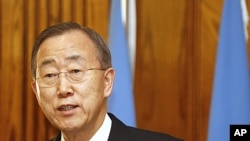U.N. Secretary-General Ban Ki-moon says the Security Council understands the "urgency" of the situation in Syria, as Arab and Western nations urge the Council to adopt a resolution calling for Syrian President Bashar al-Assad to step down.
After a meeting with Israeli President Shimon Peres, Wednesday, Ban said that all violence in Syria must stop.
"We cannot wait any longer until political process is finished, while many people are being killed. While I fully support the political solution of this issue - that is quite advisable. But first and foremost we have to take necessary action so that we will not lose any more human lives," Ban said.
Russia's European Union envoy said Wednesday he sees "no chance" of the Security Council adopting a resolution on Syria.
Vladimir Chizhov told Russia's Interfax news agency Wednesday that the proposal lacks a key provision ruling out military intervention. His comments are at odds with those of British Foreign Secretary William Hague, who told the Council Tuesday that the resolution "does not call for military action and could not be used to authorize it."
Under the Moroccan-sponsored Arab-European draft, Syrian President Bashar al-Assad would agree to halt the violence against anti-government demonstrators and give up power. Syria has rejected the plan as a violation of its sovereignty.
U.S. Secretary of State Hillary Clinton accused Assad of stoking sectarian divisions. She cited "clear" evidence that government forces "are initiating nearly all the attacks that kill civilians," and warned the country is heading toward civil war.
Qatar's Prime Minister Sheikh Hamad bin Jassim al-Thani warned the 15-nation body Tuesday that Syria's "killing machine is still at work."
Syrian U.N. Ambassador Bashar Ja'afari rejected the suggestion his government is responsible for the crisis and he accused the United States and its European allies of wanting to conquer new territory in the Middle East.
The draft resolution endorses an Arab League plan requiring Assad to transfer power to his first deputy, Farouk al-Sharaa, and allow the creation of a unity government to prepare for elections under international supervision.
Russia has vowed to oppose any Security Council measure that it believes could give Western powers a pretext for military action. Syria is a long-time Russian military ally that provides Moscow with a naval base on the Mediterranean and frequently buys Russian military supplies.
On the battlefront, activists in eastern districts of Damascus said troops backed by tanks advanced beyond areas vacated by the defector Free Syrian Army, capping three days of fighting that reports said killed at least 100 people. Government forces have now recaptured most of the places that rebels had seized last week in the capital's eastern suburbs after several days of heavy fighting, mere kilometers from Assad's seat of power.
The Syrian government accuses armed terrorists of driving the anti-Assad revolt and killing 2,000 security personnel. The United Nations estimated the death toll from the unrest at 5,400, earlier in January, before it stopped updating the figure because of difficulties in obtaining information.
Some information for this report was provided by Reuters.
| Join the conversation on our social journalism site - Middle East Voices. Follow our Middle East reports on Twitter and discuss them on our Facebook page. |




